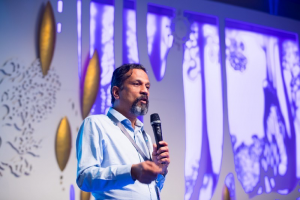Sridhar Vembu and his company, Zoho, have become a dominant player in the business software world. He is proof that you can build a dynamic thriving software company based on fundamentally good humane principles. Sridhar is part philosopher as he opines on the advantages and disadvantages of economies of scale. He thinks deeply about the human condition and contemplates how capitalism is affecting the global population as well as what he can do to make life better for his employees.
Founded in 1996, Zoho provides software solutions to help business in sales and marketing, support and collaboration, finance and recruitment needs. It has over 40 million users worldwide. Zoho CRM is its flagship service, which has won several awards such as the 2012 CRM Magazine Market Leader Award and the 2012 Sleeter 'Awesome Application' Award. Zoho Corporation is a privately-held and profitable company headquartered in Pleasanton, CA, with offices in North America, Europe, UAE and Asia.
Sridhar co-founded AdventNet in 1996, the precursor to Zoho. Since 2000, Sridhar has been CEO of Zoho Corporation. Previously, he worked as a wireless systems engineer at Qualcomm, where he started his career. He was originally a wireless systems designer and worked on satellite based personal communications systems. Sridhar obtained his bachelor’s degree in electrical engineering from the Indian Institute of Technology, Chennai and a PhD in electrical engineering from Princeton University.
Sridhar points to recent comments by Ray Dalio, one of the world’s richest people, who illustrates how our current capitalist system disproportionately helps a small minority leaving the masses underserved and struggling to make ends meet.
According to Dalio, “Capitalism is now working in a way in which people and companies find it profitable to have policies and make technologies that lessen their people costs, which lessens a large percentage of the population's share of society's resources. Those companies and people who are richer have greater buying power, which motivates those who seek profit to shift their resources to produce what the haves want relative to what the have-nots want, which includes fundamentally required things like good care and education for the have-not children.”
The societal issues brought on by capitalism spurs one to think, and Sridhar wants to make sure that at minimum his employees are not dehumanized. Because technology has made so many various tasks automated and significantly more efficient, there can be a tendency to marginalize the value of the human worker. To mitigate this risk, his employees work in decentralized small groups with a team leader who ensures the personal element to daily work remains intact.
Another very unique aspect to Zoho that most likely no other software company is undertaking, is the cultivation of an organic farm. It’s a bit odd but it also makes complete sense when considering Sridhar’s philosophy of a more human existence. It also helps that his private company doesn’t have to answer to any public investors.
























